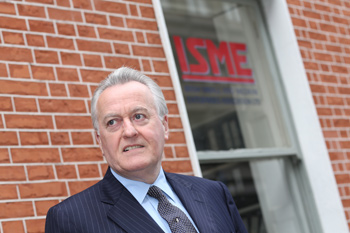SMEs’ satisfaction with government falters as year ends

ISME says government needs to 'focus on real reform, based on sound economic principles and not sound-bites'
5 January 2015
While overall satisfaction with the government from SME owner managers has improved over the last two years, satisfaction levels have dipped during the current quarter.
The latest Government Satisfaction Survey Results from ISME, the Irish Small & Medium Enterprises Association, show that in the present quarter, satisfaction levels have decreased by 2 points, from -4 to -6. SMEs are most satisfied with the government’s performance on the jobs front but least satisfied with its control over business costs and banking. The association has called on government to tackle high business costs and make improved competitiveness its priority for 2015.
ISME CEO, Mark Fielding, said: “Government needs to refrain from pre-election posturing in 2015 and to focus instead on real reform, based on sound economic principles and not sound-bites. The popularity politics of giveaway budgets and unsustainable pay promises holds little sway with SME owner-managers who are increasingly frustrated by the lack of innovative initiatives aimed at developing the sector. High business costs make it difficult to compete on the export market and increased wage pressures are making it impossible for SMEs to expand their workforce.”
“Signs of recovery are very welcome but incessant calls for wage increases from ministers, who should know better, are premature. SMEs are still weathering a storm and need breathing space to rebuild their businesses and invest to grow. Government must commit to providing a SME focused business environment in which micro, small and medium enterprises can expand.”
The results showed retail is the least satisfied sector, recording -16 points, while hospitality is the most satisfied at 14, reflecting improved trade and the retention of the 9% VAT rate.
The banking satisfaction score has improved from -47 to -44. This is a reflection of the improvements SMEs have seen in accessing bank finance in 2014 as reported in the ISME Bank Watch survey for Q4. The association said that while improvements in SME lending are very welcome, the current 38% refusal rating is still a cause for concern. Delays in the opening of the Strategic Banking Corporation (SBCI) and increasing delays in lending decisions from the bailed-out banks are also contributing to dissatisfaction in this area.
Satisfaction with business costs has decreased from -58 to -60 and is the highest dissatisfaction rating with government efforts. ISME believes the government’s ambitions to forge an exported recovery are being thwarted by high business costs, particularly state-influenced costs, and SMEs are yet to see a package of measures introduced to tackle this.



 Print
Print




Fans 0
Followers